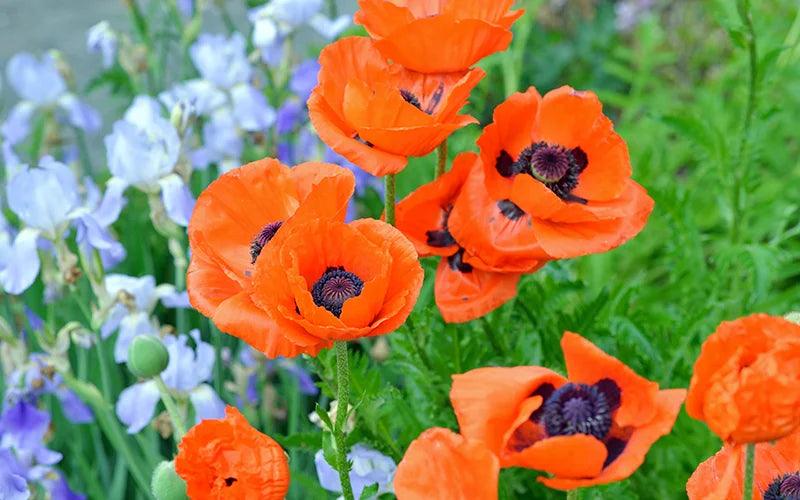The Poppy Bearded Iris, a brilliant variety of the Bearded Iris family, is a feast for the eyes with its dramatic hues of red, orange, and gold. These vibrant perennials truly come to life in late spring, offering a stunning spectacle that adds charm and color to any garden.
Native to Europe and Asia, the Bearded Iris is known for its distinctive 'beard' – a strip of fuzzy, hair-like structures on the lower petals. The Poppy Bearded Iris boasts this feature, coupled with its fiery colors, adding an element of fascination to its overall appearance.
This plant's allure goes beyond its breathtaking beauty. As a hardy perennial, the Poppy Bearded Iris returns each year to put on a dazzling show, making it a wonderful investment for your garden. Additionally, these plants are excellent for attracting pollinators, such as bees and hummingbirds, thereby contributing to the health of your local ecosystem.
Now, how does one care for the Poppy Bearded Iris? Thankfully, these plants are as resilient as they are beautiful. Here are some essential care tips:
1. Planting: Bearded Irises prefer a sunny spot with well-draining soil. The rhizomes, which look a bit like elongated potatoes, should be planted just below the soil surface. Avoid planting them too deep as it may cause them to rot.
2. Watering: Water thoroughly upon planting and only sparingly after that. Overwatering can cause the rhizomes to rot.
3. Feeding: Feed with a low-nitrogen fertilizer in early spring when new growth appears and again after blooming to encourage bulbs to store enough food for next year's growth.
4. Division: Over time, clumps of Bearded Iris can become crowded, leading to fewer blooms. Dividing and replanting every few years can help rejuvenate your plant.
5. Winter Care: Bearded Irises are winter-hardy down to USDA hardiness zone 3. However, in areas with heavy winter moisture, consider lifting the rhizomes in the fall and storing them in a cool, dry place to prevent rot.
The Poppy Bearded Iris, with its vibrant colors and intriguing form, is a great addition to any garden. It's relatively low-maintenance and brings a dramatic flair to your outdoor space. Whether planted en masse, in a border, or showcased in a container, the Poppy Bearded Iris is sure to captivate garden enthusiasts and casual observers alike.
Native to Europe and Asia, the Bearded Iris is known for its distinctive 'beard' – a strip of fuzzy, hair-like structures on the lower petals. The Poppy Bearded Iris boasts this feature, coupled with its fiery colors, adding an element of fascination to its overall appearance.
This plant's allure goes beyond its breathtaking beauty. As a hardy perennial, the Poppy Bearded Iris returns each year to put on a dazzling show, making it a wonderful investment for your garden. Additionally, these plants are excellent for attracting pollinators, such as bees and hummingbirds, thereby contributing to the health of your local ecosystem.
Now, how does one care for the Poppy Bearded Iris? Thankfully, these plants are as resilient as they are beautiful. Here are some essential care tips:
1. Planting: Bearded Irises prefer a sunny spot with well-draining soil. The rhizomes, which look a bit like elongated potatoes, should be planted just below the soil surface. Avoid planting them too deep as it may cause them to rot.
2. Watering: Water thoroughly upon planting and only sparingly after that. Overwatering can cause the rhizomes to rot.
3. Feeding: Feed with a low-nitrogen fertilizer in early spring when new growth appears and again after blooming to encourage bulbs to store enough food for next year's growth.
4. Division: Over time, clumps of Bearded Iris can become crowded, leading to fewer blooms. Dividing and replanting every few years can help rejuvenate your plant.
5. Winter Care: Bearded Irises are winter-hardy down to USDA hardiness zone 3. However, in areas with heavy winter moisture, consider lifting the rhizomes in the fall and storing them in a cool, dry place to prevent rot.
The Poppy Bearded Iris, with its vibrant colors and intriguing form, is a great addition to any garden. It's relatively low-maintenance and brings a dramatic flair to your outdoor space. Whether planted en masse, in a border, or showcased in a container, the Poppy Bearded Iris is sure to captivate garden enthusiasts and casual observers alike.




